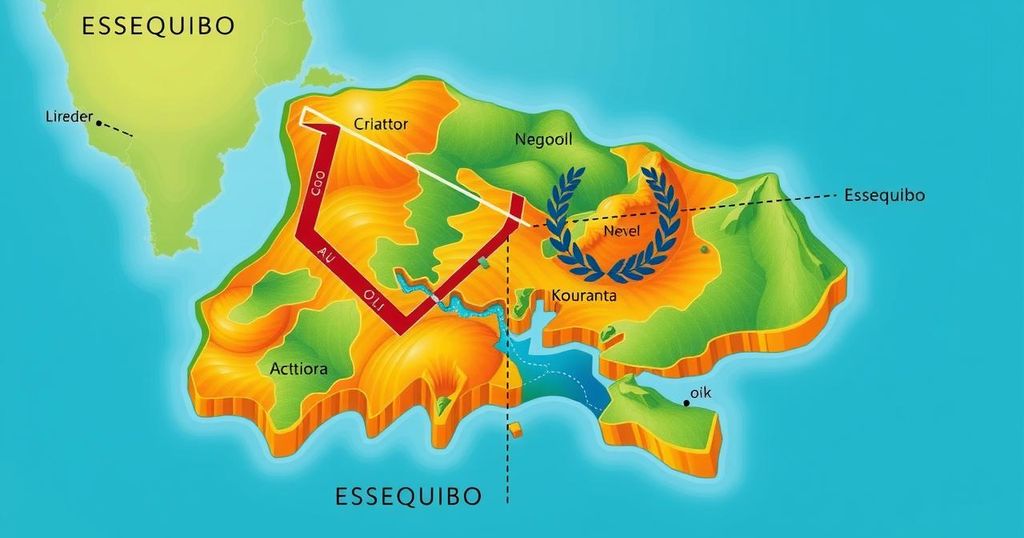Venezuela’s Election Plans for Essequibo Ramp Up Tensions with Guyana

Venezuela plans elections in Guyana’s Essequibo region, challenging international law and escalating territorial disputes. The Essequibo region, long recognized as Guyana’s territory since a 1899 rulings, is now under threat as Venezuela asserts claims based on a disputed domestic referendum. The situation raises serious concerns about regional stability, legal authority, and the increasing military tensions at the border. The international community is called to uphold the authority of the ICJ as the mechanism for resolution.
In an alarming development, Venezuela’s government, led by Nicolás Maduro, has announced plans to conduct elections in the Essequibo region of Guyana on May 25—just a day before Guyana celebrates its independence. This contested area, comprising approximately two-thirds of Guyana, is recognized internationally as part of Guyana’s territory. The Venezuelan government’s actions are not just democratic posturing but pose serious challenges to established international legal norms regarding sovereignty and territorial integrity.
Historically, the Essequibo region belonged to Guyana as affirmed by the 1899 international arbitral award. This award was ratified by Venezuela itself in its National Congress, making the long-standing boundary a matter of legal obligation. For decades, both nations accepted this arrangement until Venezuela contested the award in 1962. The Geneva Agreement, signed in 1966 on the eve of Guyana’s independence, permitted negotiations and ultimately placed the matter under the purview of the UN Secretary-General.
Fast forward to 2018, after years without resolution, that Secretary-General referred the Essequibo dispute to the International Court of Justice (ICJ). Guyana sought a ruling confirming the validity of the 1899 award. While Venezuela initially refused to engage with the Court, it eventually made submissions but disregarded the Court’s authoritative ruling, such as the recent interim order from May 1, 2025, that prohibited elections in the disputed territory.
Despite this directive, Venezuela’s National Electoral Council remains set on holding elections for eight deputies and a governor in Essequibo, though scarce details have emerged regarding the logistics of voter registration or polling. This lack of detail is unsurprising since Venezuela lacks jurisdiction over Essequibo, not to mention control within Guyana.
The Maduro administration defends its plans by referencing a 2023 referendum it conducted unilaterally. This self-supervised process has no independent verification, yet the government claims it grants them the right to annex Essequibo. Subsequently, Venezuela’s National Assembly ratified what it labels the “Organic Law for the Defense of Guayana Esequiba,” an act to formalize its claims in the region.
This raises a critical concern: How does a nation claim to conduct elections in an area it does not govern? The short answer is, it cannot, except through acts of outright occupation. Enforcing such plans would require Venezuela to encroach upon sovereign Guyanese territory, infringing upon both the ICJ’s directives and broader international law, which prohibits the use of force in territorial matters.
Venezuela’s actions seem to emanate not from nationalistic fervor but from the pressing realities of geopolitical and economic desperation. The Essequibo region is rich in resources—gold, oil, timber—which makes its strategic importance skyrocket amid Venezuela’s ongoing crises. These motivations appear to overshadow any legitimate legal argument.
Tensions continue to escalate as Guyana’s defense forces report provocations from Venezuelan troops across the border. Guyana’s government has cautioned that participation in the proposed vote could be legally classified as a criminal act. Additionally, nearly 100,000 Venezuelans now reside in Guyana, many fleeing turmoil at home, underscoring the potential for further conflict.
The global community must respond seriously. The ICJ is designed to address such disputes, and its authority must be respected. Unilateral actions that seek to sidestep the Court undermine international norms of conflict resolution and regional stability.
Countries across the Caribbean and Latin America, along with global partners, must issue a strong message: borders cannot be unilaterally altered, and nations must be held accountable to international law. Elections conducted outside recognized legal frameworks lack legitimacy and may trigger conflict.
Ultimately, Guyana and Venezuela must coexist, and that poses challenges given their geographical ties. Lasting peace cannot arise from unilateral moves or threats but should be cultivated through respect, law, and diplomacy. Both nations should await the ICJ’s ruling and seek to forge a mutually beneficial relationship based on it. The road to peace lies in diplomacy and adherence to international law, a course that must not be abandoned.
The planned elections by Venezuela in Guyana’s Essequibo region represent a dramatic escalation in territorial tensions between the two nations. With historical and legal precedents backing Guyana’s claim to Essequibo, the international community’s support for the ICJ is crucial in maintaining order and stability. Venezuela’s actions raise significant legal and ethical questions regarding sovereignty, while the rich resources in Essequibo complicate the geopolitical landscape. Ultimately, both countries must navigate this dispute through diplomatic channels rooted in respect and adherence to international law, rather than unilateral measures that threaten regional peace.
Original Source: www.thestkittsnevisobserver.com







